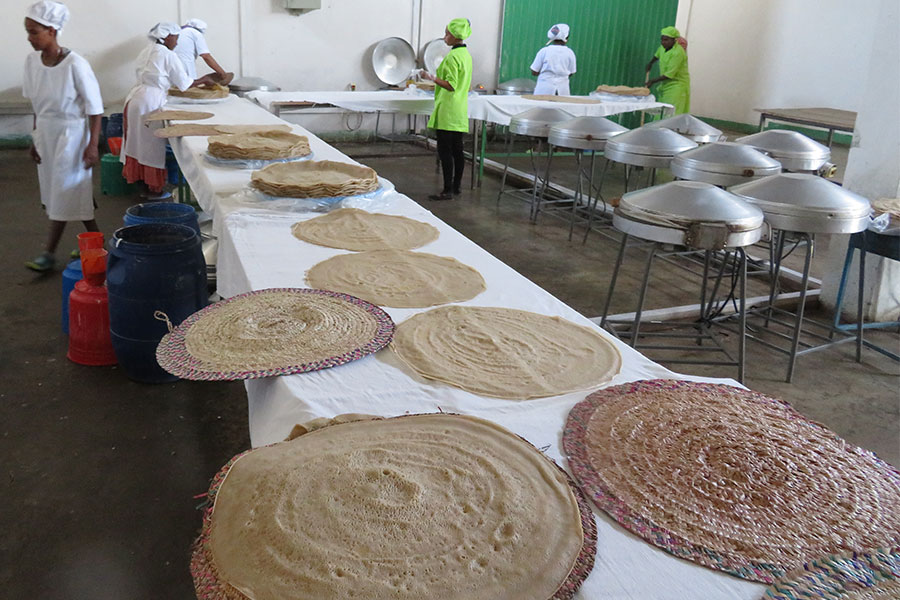
May 27 , 2023
By Brook K. Abebe
Asilent war is being waged in Ethiopia, one that is suffocating the life out of the internet, subjugating the free flow of information, and choking the economy in the process.
Ethiopia's onslaught on digital liberty is not unique, but it is becoming notorious for these digital blackouts. These are not mere temporary blips, either. Network blockages can last from mere minutes to agonising months. The fallout is far-reaching, infiltrating the everyday lives of individuals, hampering businesses and impairing essential services.
The rationale for such drastic measures varies. Justifications provided by the authorities include thwarting exam cheating, safeguarding national security, quelling protests, and dampening strikes. But detractors decry the pretextual nature of these explanations, observing a disturbing pattern in applying the internet blockades. Critics believe that these outages are, in fact, strategic instruments of control, employed to censor information and maintain a firm grip on the national narrative.
This phenomenon has gained ominous momentum under the current regime, where politically motivated internet shutdowns have taken on an insidious gravity.
The implications of such curbs on digital freedom are as extensive as they are troubling. Journalists and activists, the supposed vanguards of truth, find themselves hamstrung, unable to document alleged human rights violations and abuses committed by state and non-state actors. But the domino effect of internet shutdowns extends far beyond curtailing freedom of speech and hampering access to knowledge.
The socio-economic and political landscapes have been profoundly disrupted. The country haemorrhages millions of dollars daily, with its populace reeling from the disruption of essential services and economic activities. More alarmingly, individuals' fundamental rights and freedoms are jeopardised, including the sacrosanct right to freedom of expression. A wholesale deprivation of the right to access information imperils the vitality of a rule-based society.
For individuals caught in this maelstrom of digital silencing, the internet shutdown deprives them of accessing online news, constraining their ability to make informed decisions. It also disconnects them from peers and relatives, severing an essential line of communication in an increasingly interconnected world. This lack of communication often ignites social unrest, escalating the potential for rioting and violence.
The internet shutdown also throws a wrench in the operations of essential services such as healthcare, education, transportation, and banking. The fallout of this social and economic disruption disproportionately affects the most vulnerable. The connection between internet shutdowns and a surge in human rights violations cannot be overstated. Reports of censorship, violence, discrimination, unlawful arrests, and detentions are becoming increasingly common.
The grim financial reality is that Ethiopia loses a staggering 4.5 million dollars daily of an internet shutdown. The financial toll amounted to an eye-watering 146 million dollars last year alone. The disruption leaves individuals and businesses floundering, unable to access or provide crucial online services. Gig workers are particularly vulnerable, their livelihoods dictated by their ability to connect online.
These internet shutdowns are breeding grounds for distrust and fear, a climate that can ripple through society's fabric. The deleterious psychological effects cannot be underestimated. With increased isolation comes heightened stress, anxiety, and depression. As public trust in the state erodes, the social contract becomes increasingly fragile.
The grim reality is that the weaponisation of internet access has become a new normal. A deeply entrenched pattern of repeated shutdowns is exacting a high price on the country's economy, costing millions each year. This form of censorship is essentially cutting off Ethiopia from the rest of the world.
The stark conclusion is that the internet shutdowns have far-reaching socio-economic and political implications, potentially exacerbating poverty as businesses flounder and global markets for goods and services become inaccessible. The outcome is a population hamstrung by lost wages, missed educational opportunities, and a waste of precious time and effort. And yet, the Ethiopian government seems oblivious to the economic, social, and political cost of this digital onslaught.
This raises the question: how long can a country bleed millions of dollars, have its people live in the shadows of information darkness, and withstand the tremors of an increasingly restive society?
The evidence of the deleterious impact of these shutdowns is irrefutable. Yet, despite the mounting international pressure and the constant pleas from its citizenry, the Ethiopian government appears to be doubling down on its strategy of digital repression.
Yet, the growing toll on its populace and the economy might force a rethink soon. The authorities need to consider the long-term damage being done to its international standing and its people and work towards a more open and inclusive internet policy. Internet shutdowns are not just an affront to human rights but also carry a heavy economic penalty. Ethiopia’s experience highlights the need for a balanced approach where the internet should not be seen as a tool of repression but as an instrument of empowerment and progress.
The international community must play a more active role in encouraging the authorities to uphold the fundamental right to internet access. They must step up to the challenge of creating an atmosphere of trust rather than one of fear. It is time to recognise that the Internet is no longer a luxury but a necessity, a public utility that is as fundamental as water and electricity.
Indeed, Ethiopia has reached a pivotal moment in its digital history. Its future trajectory will significantly depend on the government's willingness to adapt to an increasingly digital world and protect citizens' rights to access the global digital community. It is time for Ethiopia to end this cycle of information deprivation and economic stagnation. I only hope that this realisation will dawn sooner.
PUBLISHED ON
May 27,2023 [ VOL
24 , NO
1204]


Commentaries | Jan 27,2024

Editorial | Dec 30,2023

My Opinion | Aug 26,2023

Commentaries | Jun 13,2020

Commentaries | Oct 23,2021

Commentaries | Jun 22,2019

Radar |

View From Arada | Nov 14,2020

Viewpoints | Feb 20,2021

Featured | Mar 07,2020

Photo Gallery | 179067 Views | May 06,2019

Photo Gallery | 169265 Views | Apr 26,2019

Photo Gallery | 160139 Views | Oct 06,2021

My Opinion | 137145 Views | Aug 14,2021
Commentaries | Oct 25,2025

Dec 22 , 2024 . By TIZITA SHEWAFERAW
Charged with transforming colossal state-owned enterprises into modern and competitiv...

Aug 18 , 2024 . By AKSAH ITALO
Although predictable Yonas Zerihun's job in the ride-hailing service is not immune to...

Jul 28 , 2024 . By TIZITA SHEWAFERAW
Unhabitual, perhaps too many, Samuel Gebreyohannes, 38, used to occasionally enjoy a couple of beers at breakfast. However, he recently swit...

Jul 13 , 2024 . By AKSAH ITALO
Investors who rely on tractors, trucks, and field vehicles for commuting, transporting commodities, and f...

Oct 25 , 2025
The regulatory machinery is on overdrive. In only two years, no fewer than 35 new pro...

Oct 18 , 2025
The political establishment, notably the ruling party and its top brass, has become p...

Oct 11 , 2025
Ladislas Farago, a roving Associated Press (AP) correspondent, arrived in Ethiopia in...

Oct 4 , 2025
Eyob Tekalegn (PhD) had been in the Governor's chair for only weeks when, on Septembe...

Oct 25 , 2025 . By YITBAREK GETACHEW
Officials of the Addis Abeba's Education Bureau have embarked on an ambitious experim...

Oct 26 , 2025 . By YITBAREK GETACHEW
The federal government is making a landmark shift in its investment incentive regime...

Oct 29 , 2025 . By NAHOM AYELE
The National Bank of Ethiopia (NBE) is preparing to issue a directive that will funda...

Oct 26 , 2025 . By SURAFEL MULUGETA
A community of booksellers shadowing the Ethiopian National Theatre has been jolted b...